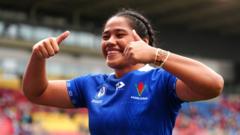Can Samoa Overcome the Odds Against England?

Published: 2025-08-29 10:24:14 | Category: sport
Samoa's women's rugby team is making a significant return to the spotlight at the Women's Rugby World Cup, competing for the first time since 2014. Facing England, the world’s top-ranked team, they are determined to make their mark despite the odds. Their journey reflects the dedication and sacrifices of players, particularly the mothers in the squad, who have left behind jobs and families to pursue their rugby dreams.
Last updated: 30 August 2023 (BST)
Key Takeaways
- Samoa's women's team is participating in their first World Cup since 2014.
- They suffered a heavy defeat against Australia, losing 73-0.
- Head coach Ramsey Tomokino views the match against England as a "mission impossible."
- Many players have made significant personal sacrifices to compete, including leaving jobs and families.
- The squad aims to inspire young Samoan girls to pursue rugby.
The Context of Samoa's Return
The Women's Rugby World Cup is a prestigious tournament that showcases the best teams from around the globe. After an eight-year absence, Samoa's return is not just about the sport but also about cultural representation and resilience. Ranked 15th in the world, their journey has been fraught with challenges, including a tough opening match against Australia, which ended in a significant defeat. This loss raises questions about their competitiveness in the tournament, especially against formidable opponents like England.
Mission Impossible: Facing England
As Samoa prepares to face England, the sentiment within the team is a blend of excitement and trepidation. Coach Ramsey Tomokino has labelled the game a "mission impossible," emphasising the stark differences between the two teams. While England boasts a fully professional squad, Samoa is largely amateur, with many players juggling other commitments, including jobs and family responsibilities.
Tomokino's challenge to his players is to "wilt the rose" and aim for an upset. He draws parallels to the biblical tale of David and Goliath, urging his team to believe in themselves and their capabilities. "It's going to be tough," he admits, acknowledging the challenges ahead. However, the coach remains optimistic, suggesting that anything is possible in rugby.
The Sacrifices of the Players
The commitment of Samoa's players is evident in their stories. Many have made personal sacrifices to represent their country, including leaving jobs and taking time away from family. Captain Sui Pauaraisa, for instance, has taken leave from her position as a clinical administrator in New Zealand. She has expressed the emotional struggle of leaving her daughters to chase her rugby aspirations but is motivated by the desire to inspire young girls in her community.
Denise Aiolupotea, another key player, has four children at home. She candidly shares her experiences of "mum guilt," but she hopes her journey serves as a powerful example for her children, demonstrating that pursuing one's dreams is possible, regardless of age or circumstance.
Team Spirit and Community Support
The camaraderie among the players is palpable, creating a supportive environment that helps them cope with the challenges of being away from family. Nina Foaese, who missed her son’s birthday, highlighted the importance of this bond. The team rallies around each other, providing emotional support and encouragement throughout the tournament.
The emotional connection extends beyond the pitch. A heartwarming moment occurred when centre Fa'asua Makisi's mother surprised her at the stadium after the match against Australia. This surprise visit, which came as a complete shock, emphasised the family ties that motivate these athletes to excel.
Celebrating Cultural Identity
Samoa’s players are not only representing their country in sport but also their culture. Their unique identity is showcased through their celebrations, such as the joyful "chee hoo," which reflects their heritage and spirit. The cultural aspect of their participation is vital, as it brings a different flavour to the tournament and highlights the diversity of women's rugby.
The Future of Women's Rugby in Samoa
Despite the challenges of competing against more established nations, the future looks promising for women's rugby in Samoa. The players and coach are hopeful that their participation will inspire the next generation of female athletes. With discussions about professional opportunities in leagues like Australia’s Super W and potential roles in the United States, there is a growing recognition of the need for more pathways into professional rugby for Pacific Island players.
Many players currently compete in New Zealand's Farah Palmer Cup but face limitations due to restrictions on non-New Zealand players in Super Rugby Aupiki. As the landscape of women's rugby evolves, Samoa's squad is eager for more competitive matches against top nations, which could further enhance their skills and visibility.
Conclusion: A Step Towards Change
Samoa's presence at the Women’s Rugby World Cup is a significant step towards greater recognition of women's sports in the Pacific Islands. The players' stories of sacrifice, determination, and cultural pride resonate deeply, not just within their communities but across the rugby world. As they face England, the squad aims to make an impact that transcends the scoreboard. Their journey is about more than just rugby; it is about empowerment, inspiration, and the pursuit of dreams against all odds. Can Samoa create a memorable moment in this World Cup? Only time will tell.
FAQs
When did Samoa last compete in the Women's Rugby World Cup?
Samoa last competed in the Women's Rugby World Cup in 2014, making their return to the tournament in 2023.
What was Samoa's score in their opening match against Australia?
Samoa lost to Australia in their opening match with a score of 73-0.
Who is the captain of the Samoa women's rugby team?
The captain of the Samoa women's rugby team is Sui Pauaraisa.
What challenges do Samoa's players face in professional rugby?
Samoa's players often face challenges such as balancing jobs and family commitments, as well as limited opportunities in professional leagues due to restrictions on non-New Zealand players.
How does the team support each other during the tournament?
The team fosters a supportive environment, helping each other cope with the emotional challenges of being away from family and encouraging one another throughout the competition.



